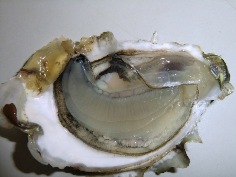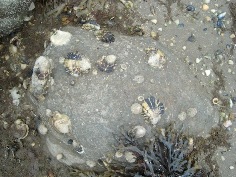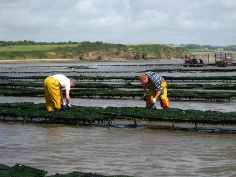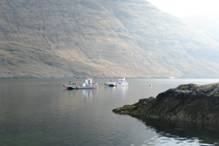Aquaculture
 Rationale
Rationale
With declining fish stocks, the aquaculture sector will continue to expand. It is critical that this expansion is undertaken in a sustainable fashion, particularly in the light of national obligations under the Habitats Directive (Article 6), the Water Framework Directive and the forthcoming Marine Strategy. The Irish aquaculture industry has signalled its willingness to adopt sustainable management practises. It has done so by signing up to recent initiatives on adoption of Environmental Management Systems (ECOPACT) and engagement in Integrated Coastal Zone Management (CLAMS). Harnessing this good will effectively requires a sound scientific basis for management recommendations. In WP3, we test empirically the positive and negative effects on biodiversity of new initiatives, which have potential for significant 
 Mhara, we ensure compliance with ethical and legislative standards and maximise the relevance and impact of our findings for industry and environmental management.
Mhara, we ensure compliance with ethical and legislative standards and maximise the relevance and impact of our findings for industry and environmental management.
Objectives
The aim of this WP is to:
- Assess impacts of aquaculture on marine biodiversity and develop innovative approaches to reduce those impacts.
- Characterise chemical and biological characteristics of the organically-enriched sediments under floating fish cages and test whether polyculture (leading to an increase in benthic bioturbation) could ameliorate these effects.
 Test impacts of bottom culture of introduced oysters (C. gigas) on (i) native biodiversity, (ii) non-indigenous species whose spread may be facilitated by the oysters cultured under specified conditions and (iii) ecosystem functioning.
Test impacts of bottom culture of introduced oysters (C. gigas) on (i) native biodiversity, (ii) non-indigenous species whose spread may be facilitated by the oysters cultured under specified conditions and (iii) ecosystem functioning.- Assess potential for other anthropogenic pressures (e.g. climate change, tourism, agricultural and industrial nutrient pollution, etc.) to interact with aquaculture and fisheries to increase or ameliorate their effects.
- Provide management recommendations and risk analyses to underpin sustainable development of aquaculture in Ireland and mitigate its effects on biodiversity and ecosystem functioning.